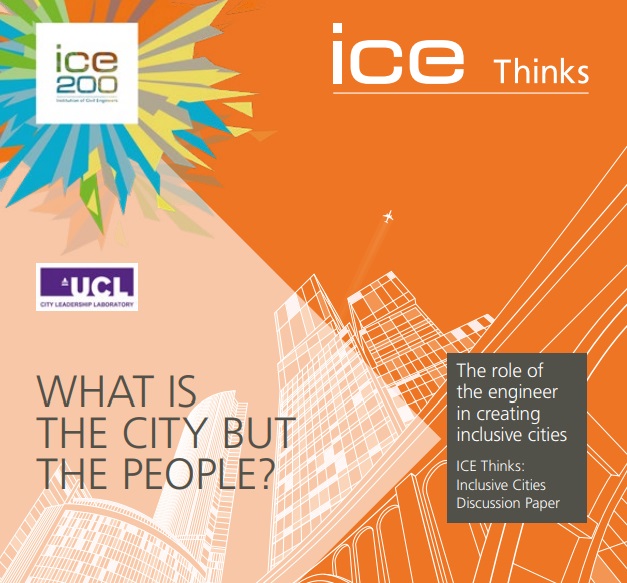The role of the engineer in creating inclusive cities
In April 2018, ICE Thinks published a discussion paper looking at how industry can make cities more inclusive.
The in-depth paper 'What is the city but the people? The role of the engineer in creating inclusive cities’ challenges industry and engineers to think harder about designing and building more inclusive cities.
The discussion paper focuses on issues such as the City at Night, the importance of the night-time economy and night workers; the Feminist City, how men and women use cities differently and how that can be incorporated from an engineering perspective; and the Accessible City, ensuring that people of all levels of mobility and accessibility requirements can use cities without issues.
This follows the Inclusive Cities conference in February 2017 where experts from across industry, policy, design, academia and the arts examined the role of the engineer in city planning and social sustainability.
In the paper, ICE issues three challenges to industry and academia about how they can help to create more inclusive cities in the future:
- Ensure greater female representation throughout the sector.
- Commission research on how infrastructure can better support the needs of night workers and the night-time economy.
- Engineers to think about design from the point of view of people with differing needs to their own.
ICE President Professor Lord Robert Mair said:
“Our citizens have vast and varied lifestyles and it is essential that our cities are able to work for them. Helping people live better, less complicated lives is at the very heart of engineering and we’re challenging the industry to do more to design and build cities that are inclusive for all, at all times, regardless of gender, mental or physical ability.
“As we celebrate ICE 200 it's apt that we not only recognise the important work of the past but consider what engineers can do for the future, helping build more inclusive communities and cities in the next 200 years.”
Dr Ellie Cosgrave, lecturer in urban design at City Leadership Lab UCL, adds:
“We want to lead our industry in debating how cities can be more inclusive. As well as value for money, we should be thinking about the social value of the things we build, and environmental and economic sustainability. Inclusivity is not a buzzword. How we design our cities impacts on people’s lives so we must ensure the infrastructure which our cities depend on is welcoming to all.”
You can download the paper here.
This article was originally published here by ICE on 25 April 2018. It was written by Emma Beer.
--The Institution of Civil Engineers
[edit] Related articles on Designing Buildings Wiki
- Articles by ICE on Designing Buildings Wiki.
- 2050 and the Future of Infrastructure.
- Access and inclusion in the built environment: policy and guidance.
- Balance for Better: Why lack of diversity is an issue for everyone.
- Capability Brown - proof that engineering for sustainability works.
- Designing smart cities.
- Engineer.
- How business can bridge the infrastructure gap.
- How to become a civil engineer.
- ICE online archives.
- Inclusive design.
- The role of civil engineering in designing out loneliness.
Featured articles and news
A case study and a warning to would-be developers
Creating four dwellings... after half a century of doing this job, why, oh why, is it so difficult?
Reform of the fire engineering profession
Fire Engineers Advisory Panel: Authoritative Statement, reactions and next steps.
Restoration and renewal of the Palace of Westminster
A complex project of cultural significance from full decant to EMI, opportunities and a potential a way forward.
Apprenticeships and the responsibility we share
Perspectives from the CIOB President as National Apprentice Week comes to a close.
The first line of defence against rain, wind and snow.
Building Safety recap January, 2026
What we missed at the end of last year, and at the start of this...
National Apprenticeship Week 2026, 9-15 Feb
Shining a light on the positive impacts for businesses, their apprentices and the wider economy alike.
Applications and benefits of acoustic flooring
From commercial to retail.
From solid to sprung and ribbed to raised.
Strengthening industry collaboration in Hong Kong
Hong Kong Institute of Construction and The Chartered Institute of Building sign Memorandum of Understanding.
A detailed description from the experts at Cornish Lime.
IHBC planning for growth with corporate plan development
Grow with the Institute by volunteering and CP25 consultation.
Connecting ambition and action for designers and specifiers.
Electrical skills gap deepens as apprenticeship starts fall despite surging demand says ECA.
Built environment bodies deepen joint action on EDI
B.E.Inclusive initiative agree next phase of joint equity, diversity and inclusion (EDI) action plan.
Recognising culture as key to sustainable economic growth
Creative UK Provocation paper: Culture as Growth Infrastructure.























